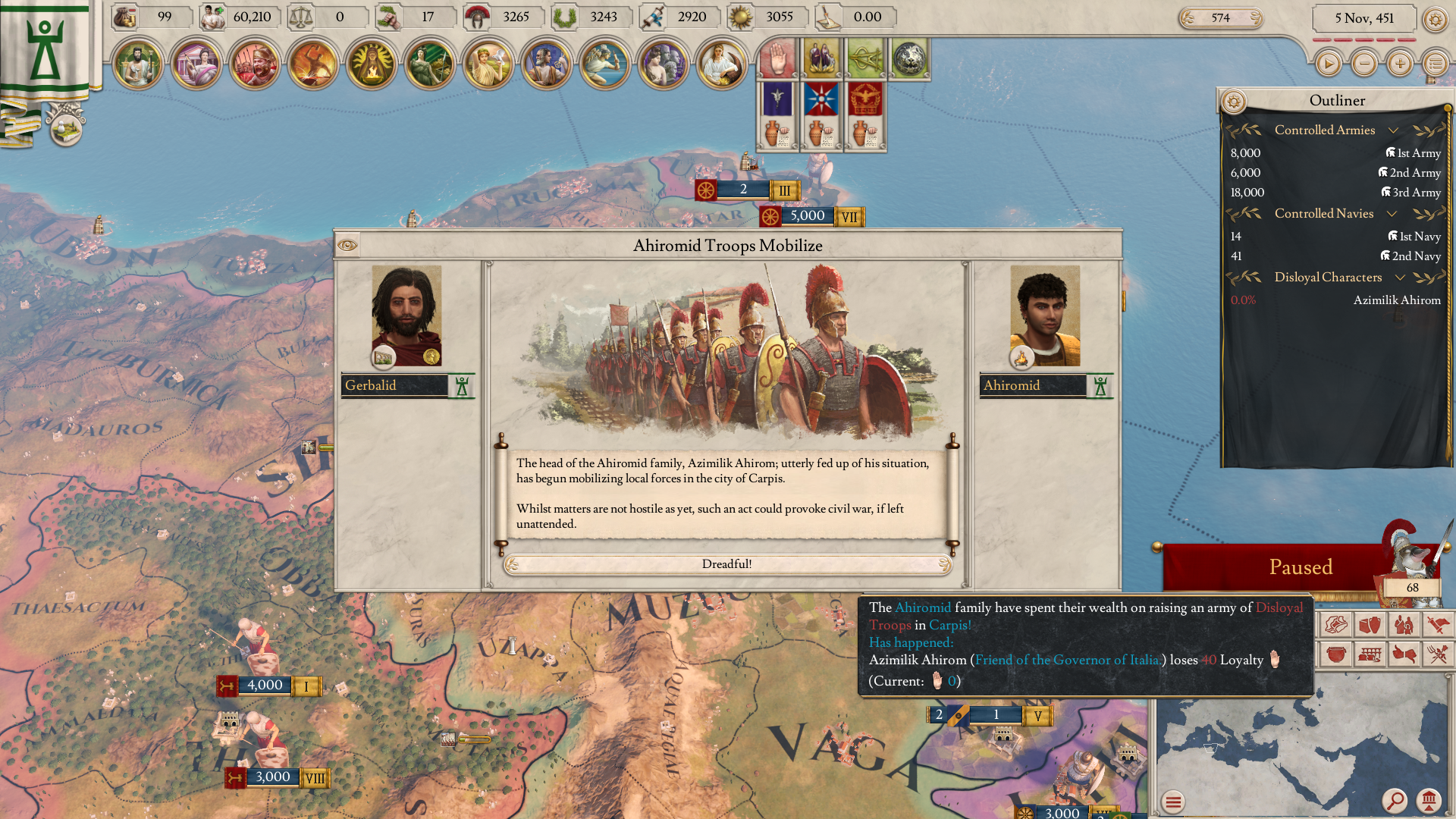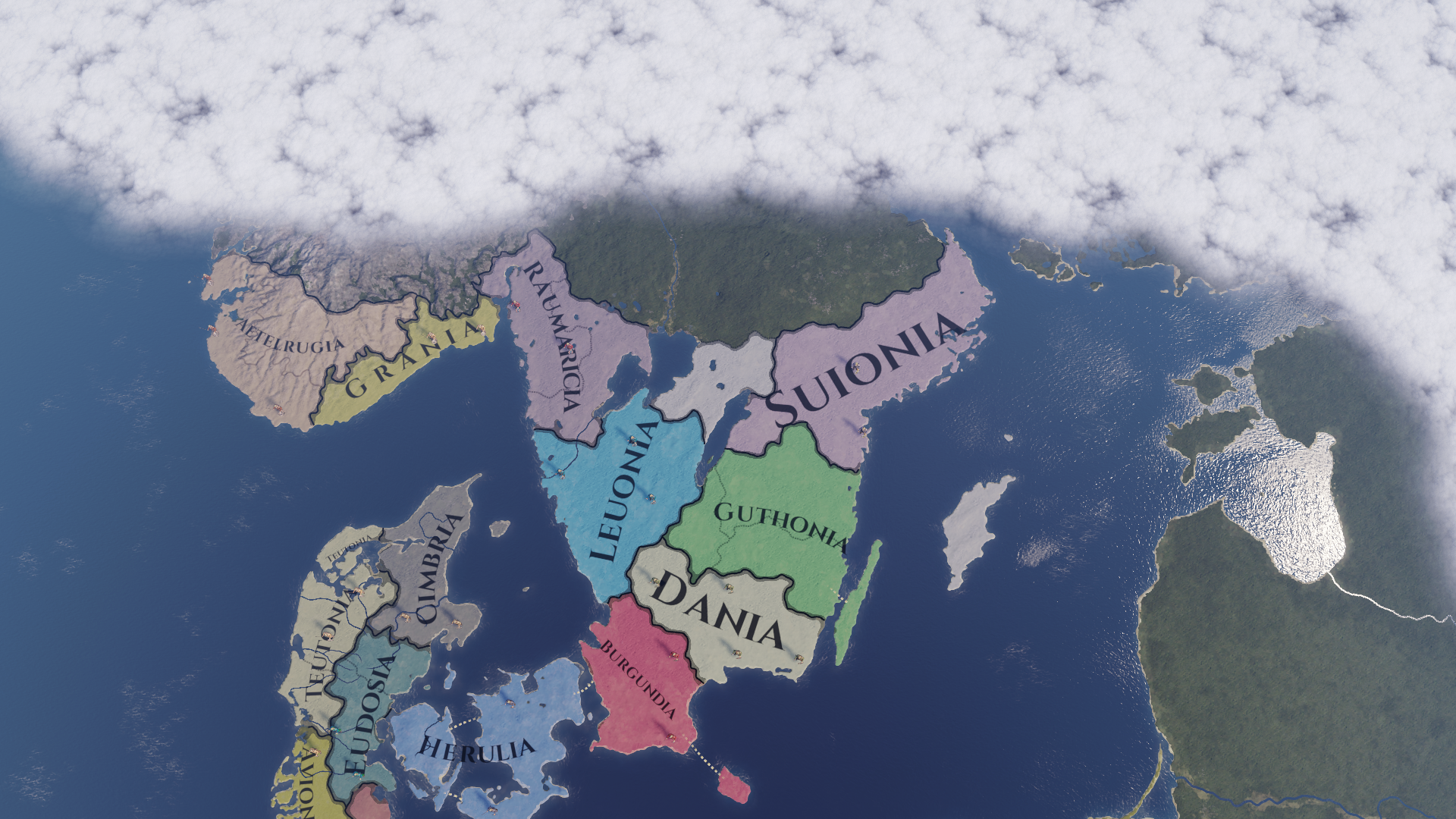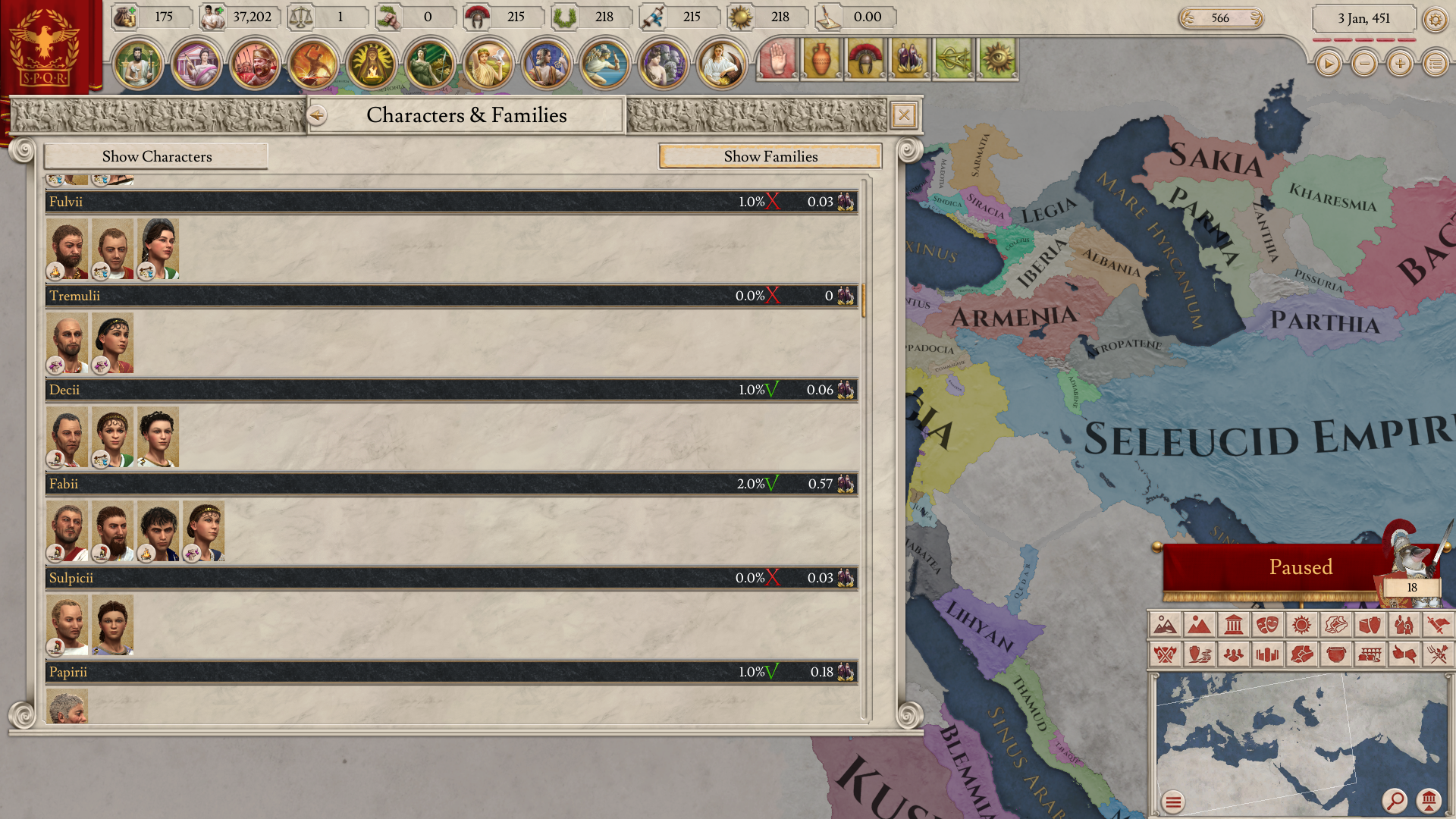Hello and welcome to another development Diary for Imperator:Rome!
Today we will be talking about Families, what they are and how they can help or harm your country. We will also be looking at the map of Scandinavia, a region that will eventually be known for its great output of Grand Strategy Games.
In Imperator countries are the main actors while Characters in many ways present both the means to- and the difficulties in achieving your national ambitions. In history however, and in this era in particular, the family was also a very important political unit. In Imperator families will look after the interests of their members, and sometimes some families will end up very involved in the future of your country.

All important characters in a country will belong to one of a limited number of families, each which has certain expectations on the state. Failing to deliver on these expectations will make them less loyal. In some instances you will be able to interact with the loyalty of all members of one family at once, rather than with each character one at a time. For instance, a marriage between your ruler (or his heir in a monarchy) will result in increased loyalty for all family members towards the state. Providing a member of a family a job will earn you loyalty with all of his kin, while confiscating the property of a person will have a negative effect on the loyalty of all of his family members.
This means that while it is in many ways beneficial for a country to acquire more characters, it is not always beneficial to acquire more important families, as these will all have expectations on you and your state.
As your country expands it might end up annexing other countries. Every time you do this you will be given a choice in how to deal with the local families of power. The conquering country can choose to receive up to four of the powerful families in the conquered country. Each foreign family you accept will cost you some Ruler Popularity, while making a public display of them can earn you some Popularity with the masses. You can also spare the foreign families, and allow them to flee to other countries, for a small Aggressive Expansion reduction.
Refugees and captives may also at times arrive in a country, but will then be considered non-citizens and not belong to any of the important families. Granting Citizenship to such foreigners will create a new family for them.
While prestige has few direct effects it is a quick way to see how influential a family has been over the course of the game, and how important it is compared to other families in your country.
Each family in a country has a head, this is one of the older and more distinguished members who consider themselves a spokesperson for the entire group. Apart from being the primary point of interaction with the family for the player the head of family will have a higher prominence, and chance of attracting loyal troops.
As mentioned families also have expectations on you. Each family in the realm expects to have a certain amount of the state wages go to them. If at any time any important family receives less than 2% of the country income in wages they will be considered a Scorned Family. The only way to avoid this demand is if the family does not have enough people that could hold salaried positions.
A Scorned Family will see all its members get a ticking loyalty modifier, reducing their loyalty to their state over time, until you fulfill their needs. This is in itself a problem but as long as the family isn’t very influential, and is without any important positions, it may be tolerable.

A Family that stays scorned long enough, and that is lead by a disloyal head of family, will sometimes raise their own army. This army will be loyal to the head of family and may contribute to a Civil War breaking out. If the head of family stops being disloyal (ie gets a loyalty above 33) the army will go away.

In the section on Germania I noted how hard it is to be able to say anything for certain about exactly what things were like there in 450 AUC (or 304 BCE). This is perhaps even more true for Scandinavia. Once again the lost works of Pytheas of Massilia could perhaps have been of help, he supposedly travelled even this far and described a land of Thule, but as they are lost to us all we have to go on are much later writers.
As is often the case though, lacking documentation does not mean that nothing was there. There is no lack of later authors that refer back to Scandinavia’s past. Nonetheless our setup here is by necessity a bit speculative, and makes liberal use of extrapolation from later testimony.
In 304 BCE Scandinavia is in some ways like the peninsula we know and love. It is densely forested, and it can often have quite harsh winters. Compared to most regions it is also quite sparsely populated and politically divided. All states that exist here are Tribal chiefdoms with very low starting centralization levels, making the area ideal for starting a tribal migration to greener pastures. Migrate is also what many of the tribes we have placed here historically did, sometimes just across the baltic sea, and sometimes far further.
At the start of the entire region will be very dynamic. There is nothing specifically to say that one of these tribes will triumph over the other, or that any specific one should migrate away. Most of these countries look deceptively extensive on a map, whereas very few pops actually live here, and all cities have very low Civilization levels.

Today we will be talking about Families, what they are and how they can help or harm your country. We will also be looking at the map of Scandinavia, a region that will eventually be known for its great output of Grand Strategy Games.
Families


In Imperator countries are the main actors while Characters in many ways present both the means to- and the difficulties in achieving your national ambitions. In history however, and in this era in particular, the family was also a very important political unit. In Imperator families will look after the interests of their members, and sometimes some families will end up very involved in the future of your country.

All important characters in a country will belong to one of a limited number of families, each which has certain expectations on the state. Failing to deliver on these expectations will make them less loyal. In some instances you will be able to interact with the loyalty of all members of one family at once, rather than with each character one at a time. For instance, a marriage between your ruler (or his heir in a monarchy) will result in increased loyalty for all family members towards the state. Providing a member of a family a job will earn you loyalty with all of his kin, while confiscating the property of a person will have a negative effect on the loyalty of all of his family members.
This means that while it is in many ways beneficial for a country to acquire more characters, it is not always beneficial to acquire more important families, as these will all have expectations on you and your state.
Acquiring New Families


As your country expands it might end up annexing other countries. Every time you do this you will be given a choice in how to deal with the local families of power. The conquering country can choose to receive up to four of the powerful families in the conquered country. Each foreign family you accept will cost you some Ruler Popularity, while making a public display of them can earn you some Popularity with the masses. You can also spare the foreign families, and allow them to flee to other countries, for a small Aggressive Expansion reduction.
Refugees and captives may also at times arrive in a country, but will then be considered non-citizens and not belong to any of the important families. Granting Citizenship to such foreigners will create a new family for them.
Citizenship

When a foreign character arrives in your country, due to annexation, being captured and then let out of prison, as a refugee from a war, or any other means, this character will be unable to be employed by the state. In order for this character to gain the right to work as a salaried member of the state you will need to grant them citizenship. This will also establish their family in your country.
Family Prestige

Each family has a prestige value, to which all its members contribute. Family Prestige signifies how important a family is and it grows mainly from the deeds, offices and income of its members.
While prestige has few direct effects it is a quick way to see how influential a family has been over the course of the game, and how important it is compared to other families in your country.
Head of Family


Each family in a country has a head, this is one of the older and more distinguished members who consider themselves a spokesperson for the entire group. Apart from being the primary point of interaction with the family for the player the head of family will have a higher prominence, and chance of attracting loyal troops.
Scorned & Outraged Families


As mentioned families also have expectations on you. Each family in the realm expects to have a certain amount of the state wages go to them. If at any time any important family receives less than 2% of the country income in wages they will be considered a Scorned Family. The only way to avoid this demand is if the family does not have enough people that could hold salaried positions.
A Scorned Family will see all its members get a ticking loyalty modifier, reducing their loyalty to their state over time, until you fulfill their needs. This is in itself a problem but as long as the family isn’t very influential, and is without any important positions, it may be tolerable.

A Family that stays scorned long enough, and that is lead by a disloyal head of family, will sometimes raise their own army. This army will be loyal to the head of family and may contribute to a Civil War breaking out. If the head of family stops being disloyal (ie gets a loyalty above 33) the army will go away.
Scandinavia

As is often the case though, lacking documentation does not mean that nothing was there. There is no lack of later authors that refer back to Scandinavia’s past. Nonetheless our setup here is by necessity a bit speculative, and makes liberal use of extrapolation from later testimony.
In 304 BCE Scandinavia is in some ways like the peninsula we know and love. It is densely forested, and it can often have quite harsh winters. Compared to most regions it is also quite sparsely populated and politically divided. All states that exist here are Tribal chiefdoms with very low starting centralization levels, making the area ideal for starting a tribal migration to greener pastures. Migrate is also what many of the tribes we have placed here historically did, sometimes just across the baltic sea, and sometimes far further.
At the start of the entire region will be very dynamic. There is nothing specifically to say that one of these tribes will triumph over the other, or that any specific one should migrate away. Most of these countries look deceptively extensive on a map, whereas very few pops actually live here, and all cities have very low Civilization levels.
Starting Countries

- Herulia: Germanic tribal chiefdom of uncertain origin. Would in time move south towards the Black Sea, making a name for itself as an enemy of the Roman Empire hundreds of years later.
- Burgundia: Tribal chiefdom in modern Scania and on the island of Bornholm. Presumed to later have moved south into the sphere of the Roman Empire.
- Dania: Scandinavian tribal chiefdom in what is today southern Sweden. Would in time migrate to the south west into the land controlled by the Herules and Burgundians at our start.
- Leuonia: Western Germanic tribe later known as Geats. Supposed ancestors of one of the peoples tied to the formation of Sweden.
- Guthonia: Tribal Chiefdom occupying the land between lake Vättern and the baltic sea. Later known as the eastern Geats. Thought by some to be the ancestors of the later day Goths.
- Suionia: Thought to be the ancestors of the later day Swedes, the Suiones control the land around Lake Mälaren in what is today central Sweden.
- Raumaricia: Tribal Chiefdom in what is today western Sweden and the region around modern Oslo.
- Grania: Small Tribal chiefdom in southern Norway.
- Aetelrugia: Tribal chiefdom in what is today western Norway, assumed to be distant relatives of the Rugians on the southern Baltic coast.
- 1


